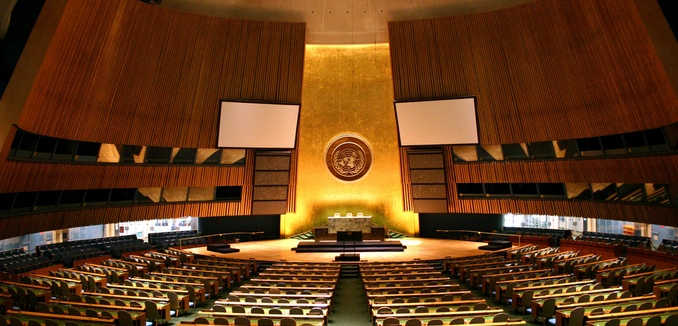The United Nations’ use of the word “occupation” to describe Israeli-held territories beyond the 1949 armistice agreement lines, which it does not use while describing seven other cases of occupation, shows that the world body “has no interest in battling injustice unless Israel is the country accused,” Eugene Kontorovich and Penny Grunseid wrote in an op-ed published in The Wall Street Journal on Tuesday.
Kontorovich, a law professor at Northwestern University, and Grunseid, a researcher at the Kohelet Policy Forum, where Kontorovich also heads the international law department, surveyed both General Assembly (GA) and Security Council (SC) resolutions since 1967. Their research found “that the U.N. uses an entirely different rhetoric and set of legal concepts when dealing with Israel compared with situations of occupation or settlements world-wide.” They explained:
Israel is referred to as the “Occupying Power” 530 times in General Assembly resolutions. Yet in seven major instances of past or present prolonged military occupation—Indonesia in East Timor, Turkey in northern Cyprus, Russia in areas of Georgia, Morocco in Western Sahara, Vietnam in Cambodia, Armenia in areas of Azerbaijan, and Russia in Ukraine’s Crimea—the number is zero. The U.N. has not called any of these countries an “Occupying Power.” Not even once.
The comparison between Israel and these other disputes is apt, Kontorovich and Grunseid wrote, because “all these situations have seen settlement activity, typically on a scale that eclipses Israel’s.”
Moreover, since 1967, GA resolutions have referred to territories under Israeli control as “occupied” 2,342 times, while using that language in reference to those mentioned above just 16 times total. This is despite the fact that those other conflicts “involve the full gamut of human-rights abuses, including allegations of ethnic cleansing and torture,” Kontorovich and Grunseid observed. These resolutions “employ the term ‘grave’ to describe Israel’s actions 513 times, as opposed to 14 total for all the other conflicts,” and use verbs such as “condemn” and “deplore” tens more times than in resolutions about other conflicts, “setting a unique tone of disdain” toward Israel, they wrote.
The UN has also called on Israel to follow its Geneva Convention obligations around 500 times since 1967. In contrast, it issued two such reminders for occupying powers in other conflicts over the same period. The resolutions targeting Israel have often referred to Article 49(6), which states that the “Occupying Power shall not deport or transfer parts of its own civilian population into the territory it occupies.” This, Kontorovich and Grunseid wrote, is the basis for “the entire legal case against Israel settlements.” Yet it has never been cited regarding any of the other conflicts mentioned above.
The legally significant term “settlements” has likewise been used to describe Israeli civilian communities established beyond the 1949 armistice agreement lines 273 times by both the SC and GA. Neither body has used the term “settlements” to describe civilian communities in any of the other seven conflicts.
Kontorovich and Grunseid observed that, as this data reveals, “the organization’s claim to represent the interest of international justice is hollow, because the U.N. has no interest in battling injustice unless Israel is the country accused.”
This systemic bias would make the UN a poor venue for President Barack Obama or others to attempt to solve the Israeli-Palestinian conflict, they argued, as “the leaders of the free world cannot afford to tempt the U.N. into indulging its obsessions.”
Kontorovich recently published a paper, “Unsettled: A Global Study of Settlements in Occupied Territories,” which provides an in-depth look into how occupied territories are treated by international law. He has also in the past examined the double-standards evident in the UN’s treatment of Israel as opposed to its stance on Turkey’s occupation of northern Cyprus, Armenia’s occupation of areas of Azerbaijan, and Morocco’s occupation of Western Sahara.
[Photo: Patrick Gruban / Flickr ]




